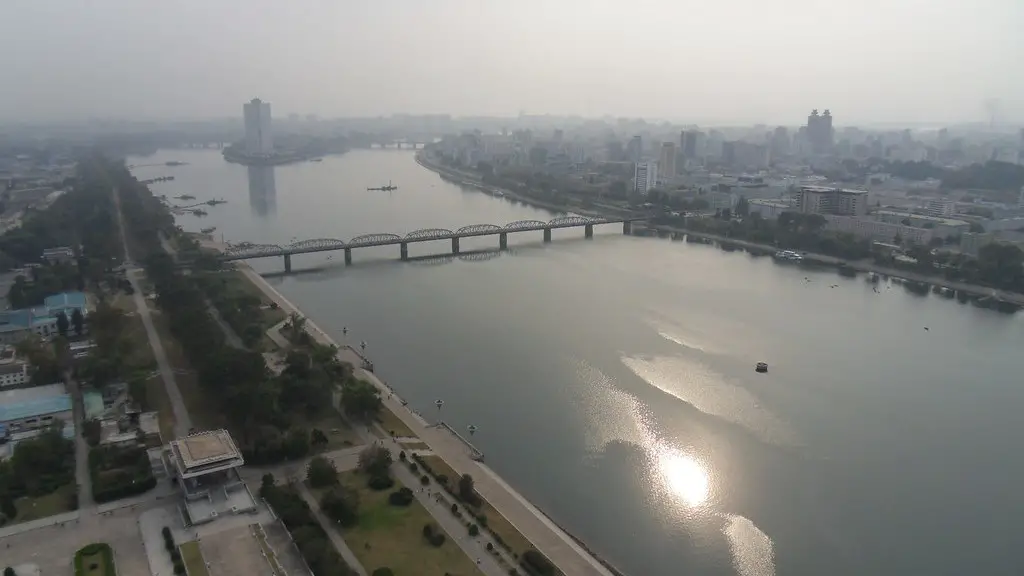Introduction
The surprise announcement that North Korean leader Kim Jong Un is reportedly “in frail health” has triggered questions about who might take over the hermit kingdom. North Korea is an isolated nation with a long-standing history of controlling its citizens and limiting information from the outside world. It is led by the Kim family, and has been since the end of the Japanese occupation in 1945. Kim Jong Un had come to power in 2011, following the death of his father, Kim Jong Il. As his health has been declining in recent months, it is uncertain whether he will be able to remain in power and a succession plan remains unclear.
Factors at Play
A number of key factors will determine who will take over North Korea in the wake of Kim Jong Un’s health scare. Chief among them are the succession of power within the Kim family itself and the potential for a military takeover should Kim’s health continue to decline. Other factors to consider include the regional reaction to a new leader, the reaction from North Korea’s policy-making institutions, and how well the North Korean people will accept a new leader.
Succession of Power
The primary factor in determining the succession of North Korea is the succession of power within the Kim family. North Korea is a totalitarian state in which the leader serves for life; this means that Kim Jong Un’s successor will come from within the family. It is still uncertain who within the Kim family is primed to take over. Some experts have speculated that Kim Jong Un’s sister, Kim Yo Jong, could be a potential successor, while others suggest the Kim Jong Un’s brother, Kim Jong Chul, could take over. It remains to be seen who will be chosen—if anyone—to succeed Kim Jong Un in the event of his incapacitation or death.
Military Takeover?
Another factor to consider is the potential for a military takeover should Kim Jong Un’s health continue to decline. North Korea is an authoritarian state in which the top echelons of power are firmly entrenched in the military. If the military decide to move to take control of the nation, it could result in a period of political instability before the succession of power is determined. This could lead to an extended period of uncertainty in the region, as the power vacuum left by Kim Jong Un’s potential incapacitation could result in a power struggle between regional powers.
Regional Reactions
The regional reaction to a new leader in North Korea will be a key factor in determining who will take over the nation. South Korea, Japan, and China—the three countries with the most vested interests in the stability of North Korea—will likely all have their own reactions to the power change. South Korea and Japan, both US allies, could look to the US for guidance during the transition process. China, meanwhile, is a key economic partner to North Korea and could use its influence to shape the future of the country.
Policy-Making Institutions
The reaction from policy-making institutions in North Korea will be another key factor in determining who will take over the nation. North Korea’s power structure is rooted in the powerful policy-making institutions responsible for managing the nation’s economy, military and more. Any new leader must have the backing of these institutions if they are to remain in power. A significant shift in the policy-making landscape could influence the succession of power, as the institutions may decide to either back a leader from within the Kim family or look to an outside leader altogether.
Acceptance of New Leader
Finally, the North Korean people will have to accept the new leader in order for the succession of power to be successful. North Korea is a heavily controlled state in which information from the outside world is heavily restricted. It is also a deeply conservative nation in which traditions and customs are highly revered. For these reasons, it is uncertain how the North Korean people will respond to a new leader, particularly if the leader does not come from within the Kim family.
Instability
The death of Kim Jong Un and a potential period of instability in North Korea could create major security risks for the region. It could lead to an influx of refugees, or even a military intervention from the US or one of its allies. This could lead to a period of heightened security and military brinkmanship, as regional powers fight for control over the fate of North Korea. Moreover, a prolonged period of instability may further destabilize the region and threaten international peace and security.
Impact on Nuclear Program
Another key factor to consider is the potential impact of Kim Jong Un’s death on North Korea’s nuclear program. North Korea is believed to have a sizeable nuclear weapons stockpile and Kim Jong Un has been a key figure in the country’s nuclear program. The death of Kim Jong Un and a period of political instability could lead to the proliferation of nuclear weapons, with countries in the region vying for control of North Korea’s nuclear arsenal. This could lead to a major security risk for the entire region and beyond.
Economic Consequences
The death of Kim Jong Un and a possible period of instability also has potential economic consequences. Any period of tumult in North Korea could lead to a decrease in foreign investment, as investors may fear that their money will be lost during a power struggle. This could have serious repercussions, especially if the new leader in North Korea is not backed by major economic powers. This could further hamper economic development and worsen the nation’s already fragile economy.
US Influence
The US is also likely to be an important factor in determining who takes over North Korea. The US has a long history of involvement in the region and has taken a hard stance towards North Korea in recent years. In the event that Kim Jong Un’s health takes a turn for the worse, the US may seek to use its influence in the region to shape the succession process. This could lead to a prolonged period of political turmoil and further destabilize the region.
Regional Powers
The succession of power in North Korea may also be shaped by the reactions of regional powers. China, South Korea, and Japan all have vested interests in the region and could be affected by any shift in power in North Korea. Any one of these countries could seek to shape the succession process through diplomatic or military pressure, which could lead to a period of heightened tensions in the region.
Implications on Future
The death of Kim Jong Un and the resulting succession of power could have major implications for the future of North Korea and the region as a whole. Any new leader in North Korea will have to contend with the nation’s precarious political and economic situation, as well as a potential power vacuum in the region. The new leader may also have to contend with a period of political and economic turmoil, as well as a potential military intervention from the US or one of its allies. This could have serious repercussions for both North Korea and the region as a whole.



